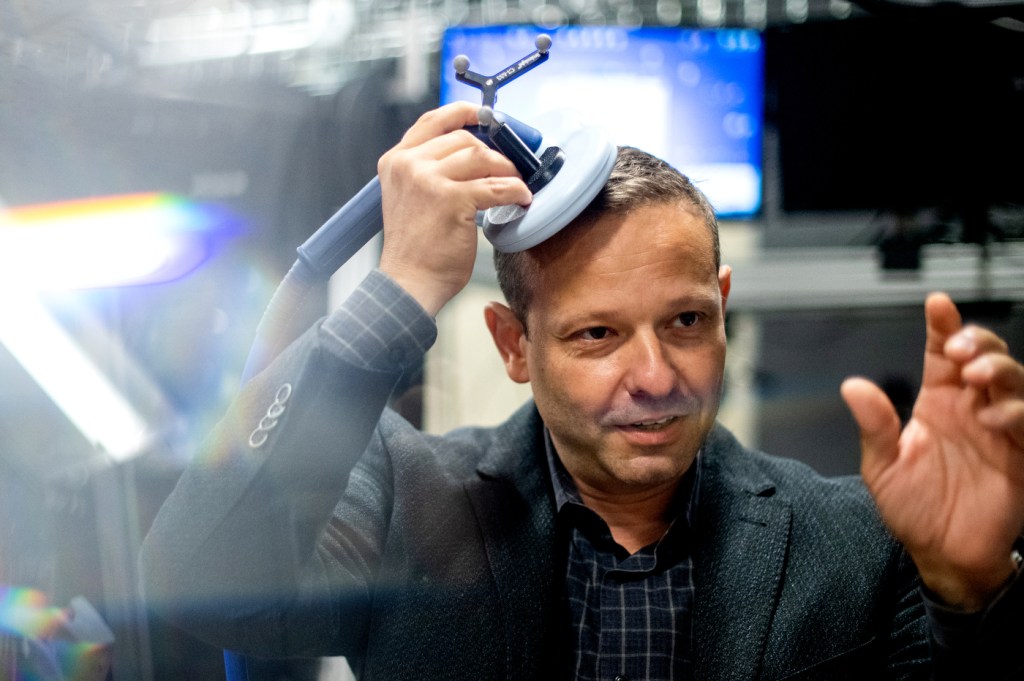Why a groundbreaking brain stimulation machine promises new health insights

Northeastern will soon be home to a “revolutionary” new brain stimulator that could unlock frontier research opportunities across a range of scientific fields.
A group of researchers, with funding from the National Science Foundation, will acquire a machine capable of delivering transcranial magnetic stimulation (TMS), a type of non-invasive brain stimulation that scientists say could be used to study a range of health problems, brain functions, and behaviors.
Potential applications for this kind of non-invasive brain stimulation are endless, says Gene Tunik, associate dean of research and innovation at Bouvé College of Health Sciences, and the principal investigator who is overseeing the funding for the project. The technology can be used to study everything from cognition, emotion, and memory to movement disorders, motor function, and aging, he says.
The instrument, dubbed cTMS, could also pave the way for advances in computational modeling fields that focus on brain circuitry, says Tunik, whose research is focused on how the brain controls movement in healthy people, as well as in those with neurological diseases. He is also professor in the physical therapy, movement and rehabilitation sciences department.
“This is a pretty big deal,” Tunik says. “There’s a lot of research that’s going to be enabled by this machine.”
But it still has to be built, he says, adding it will not be on campus for at least six or so months. When built, it’ll be the second such instrument of its kind available for research purposes in the U.S., Tunik says.


Transcranial magnetic stimulation works by directly stimulating nerve cells, or neurons. An electromagnetic coil is placed over the patient’s brain, sending a magnetic pulse that induces an electric field in their brain. Researchers traditionally have been able to control the intensity of the pulse to activate smaller or larger groups of neurons in the brain, or “neural populations,” and observe the resulting behavioral effects on awake patients in real-time.
The challenge, however, has been how to easily activate specific types of neural populations, an obstacle that has prevented scientists from drawing a direct causal link between certain behaviors and their associated neural subtypes.
In changing the pulse shape, or the waveform, emitted through the coil, scientists can actually excite or disinhibit certain neural populations, Tunik says. This is possible because groups of cells that comprise brain tissue, and which are variously responsible for all of the body’s functions, may have different electrical properties, and may therefore differentially respond to changes in pulse shapes.
This kind of superficial stimulation, which Tunik says is reversible and has had decades of safety testing, allows researchers to study “causal relationships between the brain and behavior,” using TMS in combination with other “specialized recording equipment” that directly measure brain and muscle activity.
Other existing methods, like functional magnetic resonance imaging, or fMRI, only measure brain activity indirectly by detecting changes in blood flow. Even an electroencephalogram, or an EEG, which measures electrical activity in the brain, is limited in the sense that it’s “not very spatially specific,” Tunik says.
“This is going to allow us to ask research questions that we couldn’t ask before, because we didn’t have the means to do so,” says Mathew Yarossi, an associate research scientist at Northeastern with a background in biomedical engineering, who is also part of the research team.
Transcranial magnetic stimulation has been in development since the mid-80s, but the so-called “controllable pulse wave-form technology” that lets researchers isolate brain circuits in such granular detail is relatively new, Tunik says.
“This is a pretty powerful tool,” Tunik says.
And it’s purportedly safe. Transcranial magnetic stimulation is FDA-approved to treat a variety of health conditions, such as depression, obsessive compulsive disorder, anxiety, and headaches, among other things. Tunik says he believes there have only been a dozen or so cases of seizures caused by TMS in its nearly forty years of testing—most of which occurred in the earliest years of research. Seizures remain the most serious complication from TMS, but the risk of it is “exceedingly low,” according to researchers at Johns Hopkins University, where the technology is also in use.
The National Science Foundation will award the research team roughly $600,000 across two years, with a $179,000 cost-share from Northeastern, to purchase the TMS machine, a robot controller, and several other devices used to measure brain signals, Tunik says.
It’ll be the first ever so-called major research instrumentation grant received by the Bouvé College of Health Sciences, and the fourth ever obtained by Northeastern University, Tunik says.
Other researchers credited with helping secure the grant include Deniz Erdogmus, professor of electrical and computer engineering; Dana Brooks, professor emeritus of electrical and computer engineering; Susan Whitfield-Gabrieli, professor of psychology; and Sumientra Rampersad, assistant research professor of electrical and computer engineering.
Conversations will soon be underway to determine where the TMS machine will be housed. Tunik says it might eventually be located in the Interdisciplinary Science and Engineering Complex, or the EXP building that’s currently under construction.
For media inquiries, please contact media@northeastern.edu.






